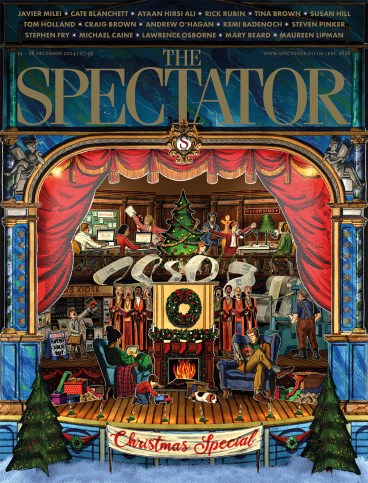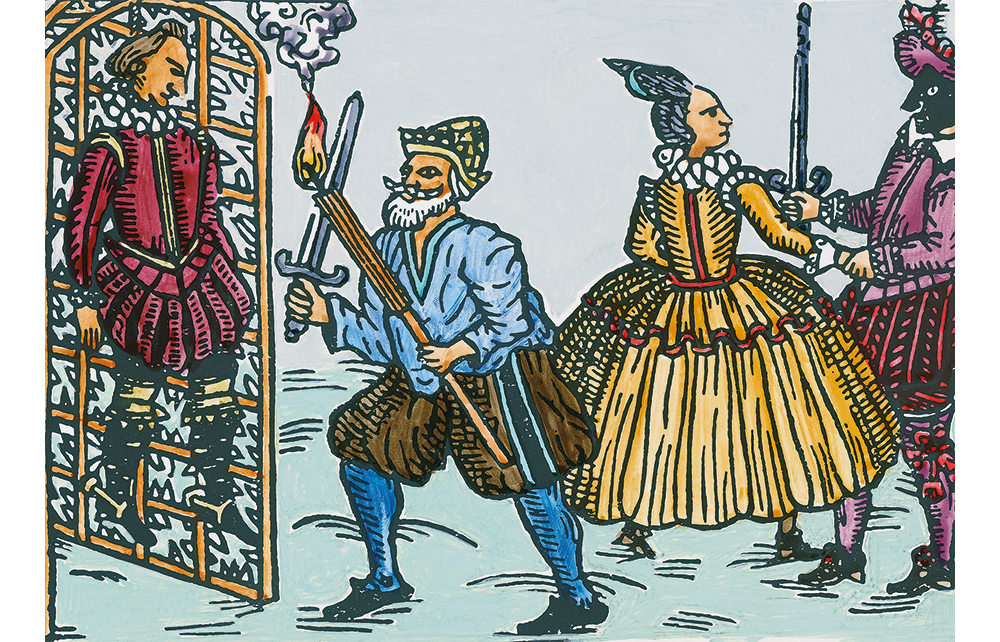
The biggest blockbuster hit of the Elizabethan theatre was not by William Shakespeare or Christopher Marlowe or Ben Jonson. In fact it wasn’t by anyone. The Spanish Tragedy, a sturdy play of rhetoric, blood and revenge, was published in multiple editions without any attribution at all. Its central figure, Hieronimo, was a cultural phenomenon, but the drama was widely quoted, imitated and parodied without mention of its author. Its impact was huge. We wouldn’t have Hamlet without it. BBC Radio 4’s invitation to celebrities to try experiences they have unaccountably missed is called I’ve Never Seen Star Wars. Without a doubt, the Elizabethan equivalent would have been I’ve Never Seen The Spanish Tragedy.
Not until a quarter-century after its first performances was an author mentioned. Step forward Thomas Kyd. Unsurprisingly for a man who did not dine out on his authorship of the theatre’s most significant bestseller, Kyd has left few clear biographical traces. We know that he was baptised in St Mary Woolnoth in November 1558, the son of a scrivener, or professional scribe. He attended Merchant Taylors’ School in the City, a grammar school with 250 pupils, supervised by the humanist teacher, educational theorist and Latin poet Richard Mulcaster. The focus there was on intensive Latin grammar, rhetoric and composition, and probably it was at Merchant Taylors’ that the young Kyd first encountered drama: the works of the Roman playwright Terence were part of the curriculum. His biographer and champion Brian Vickers, an expert on Renaissance rhetoric, paints this part of Kyd’s intellectual formation in clear and authoritative detail.
Kyd’s literary output is hard to pin down. Only a translation of Robert Garnier’s French tragedy Cornelia, published posthumously, bears his name in contemporary print. Another translation, from Tasso, is published under the initials T.K., and so too is a pamphlet of English and Latin verse printed in the aftermath of the Babington Plot, the assassination attempt on the queen.
Perhaps he was employed as a secretary by the literary patron Ferdinando Stanley, the Earl of Derby; but Kyd only comes into the historical records when he is implicated in the murky politics swirling around Marlowe in 1593. ‘Vile, heretical’ papers found in their shared bedsit resulted in Kyd’s arrest and torture. He maintained that they belonged to Marlowe, adding that among his ‘monstrous opinions’ were the jesting claims that St John was Christ’s lover and ‘Paul a juggler’. It is a deep irony for this occluded author that the only papers we have in his own son-of-a-scrivener handwriting are Kyd’s strenuous attempt to deny his authorship of these contested and incriminating texts. He did not long survive his imprisonment and died in August 1594, aged just 36.
Out of this rather fugitive biographical and literary record, Vickers triumphantly presents ‘a dramatist restored’. Drawing inspiration from a contemporary description of Kyd as ‘industrious’, the book grants him sole authorship of another four plays, plus part-authorship of two more. Soliman and Perseda, Fair Em and King Leir – previously better known as a source for Shakespeare’s decisively re-spelled tragedy – are all currently anonymous plays, now attributed to Kyd.
He is also claimed as co-writer with Thomas Nashe of a version of the play we now know as 1 Henry VI, before the young Shakespeare got his hands on it. Vickers also has him working with Shakespeare on another history play, Edward III. Perhaps most contentious of all the claims for this expanded Kyd canon concerns the domestic true-crime play Arden of Faversham. Vickers spends a chapter, titled ‘Denying Kyd’, on arm-wrestling his critical adversaries around this particular attribution: many contemporary scholars judge Shakespeare to be a more likely contender for part-authorship of Arden. Under an epigraph from Charles Darwin about the importance of killing errors, Vickers presents this scholarship as a ‘deviation from the progress of knowledge’, and judges the Shakespeare claims ‘a disaster’.
A majority of plays from the 1590s were published anonymously and for most of them we have no additional external evidence that can securely identify their author or authors. Any attempt to discover who wrote them (the question of why this is important to us if it was not important at the time is rarely addressed) must therefore find internal evidence within the texts themselves.
The methods of attribution studies, however, are dependent on particular assumptions about authorship itself. Is work by the same author always similar, and if so, in what ways? Should we be looking for echoed phrases, or source material, or plots? Might other factors account for such similarities, such as the shared repertory of a theatre company, or the expectations of a particular genre? Do authors imitate each other, consciously or unconsciously, and how can we distinguish such imitation from original authorship? Does an author’s work change across their career and, if so, what similarities should we expect to see across that period? Who is better at doing this attributive work: literary critics or computers?
Vickers has a reputation in the pages of the TLS and elsewhere as a robust antagonist on matters of attribution. There are passages of the book that expound various dry computerised tests, treated reverentially as objective corroborators of the book’s attributive claims. But, mostly, the approach is enjoyably literary-critical. Vickers explains mildly that his method of attributing plays to Kyd is mainly based on spotting dramaturgical similarities that form into a distinct style. These are the shared occurrence of ‘murderous intrigues, the use of comedy in tragedy, and the presence of vengeful women’ (except in the comedy Fair Em, which has only the first).
It is a generous claim, not least because its reliability can so easily be challenged. Take another play of the early 1590s, also initially published anonymously: Titus Andronicus. Its many intrigues have as their architect the villainous Moor, Aaron, whose plotting results in numerous deaths; its stage history is a prospectus of different attempts to reconcile farcical comedy with horrific tragedy; its central woman dresses as ‘Revenge’, to punish the murderer of her son. But despite the fact that it so clearly complies with the three key resemblances that would point to Kyd as author, not even his stoutest advocate would claim the play as by Kyd. Rather, the plot similarities can be explained by proximities other than authorship: the particular tastes of theatre audiences over a short period; or the hyper-awareness among London’s playwrights of what worked well with the punters; or their shared grammar school resources. Similarity can be produced by different authors, just as a single author can have a startling range. The attempt to build a Kyd canon is based on unexamined and self-confirming certainties about what constitutes an authorial signature.
Did Kyd write all these plays? The book claims so, but is ultimately not convincing. Vickers’s literary attention to the unloved and anonymous plays is revelatory, but not about their authorship. The blurb for this book suggests it offers ‘a major reassessment of an underappreciated Elizabethan playwright’. But The Spanish Tragedy has never been underappreciated, and none of the plays attributed to its author here, except perhaps Arden of Faversham, is a patch on that Elizabethan barnstormer. Sometimes less is more.








Comments